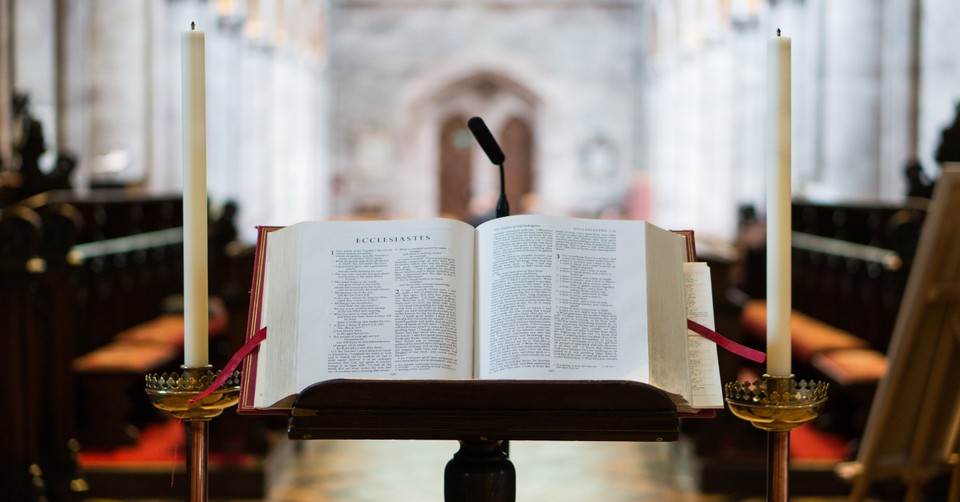Why Do We Need Church Discipline?

Church discipline was an integral functioning part of the church for generations. Pastors and other leaders from among the body addressed the offending party concerning the purported “stain” against the church. Today, however, most churches and denominations have shelved any direct confrontation of known sinful activities within the church. The pastor and the leadership council are fearful of losing members or getting a reputation of being judgmental within the community, hindering those who may consider visiting.
A necessary consideration is whether numbers are worth more than the detrimental costs to the make-up of the church in the quality of membership and how sin “inside the camp” is directly connected to the spiritual effectiveness of the church. The purpose of the physical church is for the worship of our Lord and the spiritual growth of the membership inside the walls and the spreading of the gospel on the outside.
Photo Credit: @steve228uk
Achan’s Disobedience
The story of the blatant disobedience of Achan in Joshua 7 is enlightening to the church deficient in the area of discipline. As you recall, God’s people were victorious in the miraculous destruction of Jericho without having to physically fight or even “fire a shot.” Their obedience and the power of God were the reasons for the victory.
In Joshua 6:18, the Lord commanded His people to “keep [themselves] from the accursed thing, lest ye make yourselves accursed, when ye take of the accursed thing, and make the camp of Israel a curse, and trouble it.” Following the Jericho victory, the children of Israel soon thereafter suffered a seemingly unexplainable defeat against a militarily overmatched Ai. The upset for the ages caused Joshua to question God as to why He allowed the people to be defeated so soon after their deliverance thereby showing other nations a supposed vulnerability. The Lord answered, “Israel hath sinned, and they have also transgressed my covenant which I commanded them: for they have even taken of the accursed thing, and have also stolen, and dissembled also, and they have put it even among their own.”
After the investigation, Achan admitted to taking a Babylonian garment, 200 shekels of silver, and a wedge of gold. Not only was Achan guilty of coveting the spoils, but also committed sin against God by defying His commandment. The Lord was clear in his explanation to Joshua. In verse 12, He warned that the people must be sanctified because “there is an accursed thing in the midst of thee.” If not remedied, “thou canst not stand before thine enemies, until ye take away the accursed thing from among you.” Understanding the dire consequences of the presence of the sin among the people, Joshua took Achan, his family, their possessions, and the stolen spoils to the valley of Achor. There they were stoned and burned. As a result of this “cleansing” and sanctification, the people enjoyed a great victory in its rematch against Ai. The restoration was realized following the elimination of the “accursed things.”
What Sins Should Force the Hand of the Church to Act?
The preaching and ministering to the lost in the congregation serve as a warning to those who may regularly visit the church. The jurisdiction for church discipline is the membership or regular attendees whose detrimental conduct can be directly associated with the church. In 1 Corinthians 5:12, Paul explained that “them that are without God judgeth” and remove yourselves from “that wicked person.” He asked, “for what have I to do to judge them also that are without? Do not ye judge them that are within?”
The church, however, has a duty to confront reproaches committed by its members. Paul felt compelled to address the presence of sin within the church at Corinth in 1 Corinthians 5. The church was proud to be accepting of individuals who engaged in sinful behavior. In verses 1 and 2, he confronts them that “it is reported commonly that there is fornication among you” and “ye are puffed up, and have not rather mourned, that he hath done this deed might be taken away from among you.” The church at Corinth was neglectful by allowing the individual to remain among them without addressing the sin of fornication. He added in verse 5, “to deliver such an one unto Satan for the destruction of the flesh, that the spirit may be saved in the day of the Lord Jesus.” Any open sin which could be perceived as a stumbling block to the lost should be addressed by the church.

What Are the Biblical Means of Handling Church Discipline?
Just as Joshua went to the Lord, the church must turn to Him as soon as we realize something is amiss following a time of unexplained failure or season in which the Lord seems distant. We look to Him in guidance through prayer and His Word. Matthew 18:15-20 gives the church clear step-by-step instructions on how the church should handle discipline with a fellow brother or sister in the congregation. These avenues are mentioned regarding personal issues between believers, but are equally applicable to the church being a party.
We first must confront the person individually and privately. At this stage of the “intervention,” the party will either admit to the allegation and agree to do what is necessary to return to the right fellowship with the church body, deny the sinful action totally, or agree with the allegation and refuse any corrective action. Verse 15 instructs “if your brother sins against you, go and tell him his fault, between you and him alone. If this action fails to correct the issue, we are to “take one or two others along with you, that every charge may be established by the evidence of two or three witnesses.”
If the behavior or the offense still fails to be corrected, we then “tell it to the church.” In Galatians 6:1, Paul instructs believers to “restore [one caught in any transgression] in a spirit of gentleness.” Restoration is the clear goal with any confrontation of sin, just as salvation is a resolution of the conviction of the Holy Spirit upon a sinner. If the offending member admits to the sinful activity to the church and fails to make any effort in repentance, the church must act decisively. Separation of membership is a potential result. Additionally, church leadership is not immune from discipline. In 1 Timothy 5:19-20, Paul instructed his dear friend, “do not admit a charge against an elder except one the evidence of two or three witnesses. As for those who persist in sin, rebuke them in the presence of all, so that the rest may stand in fear.”
Photo Credit: ©Thinkstock
What Are the Costs of Not Taking Church Discipline Seriously?
The people of Israel suffered great defeat and were warned much of the same was to come if the sin was not eliminated from among the people. Similarly, the church today will be hindered from its full potential with active sin among its membership. Under the Mosaic covenant, God’s people were promised land and its blessings for obedience. We are no longer under this covenant, but our promise is of spiritual blessings and empowerment from the Holy Spirit. The same bestowments are the desires of a vibrant church. The power of the Holy Spirit is quenched by the presence of sin. Great victory will be impossible when sin is among God’s people.
Paul taught the early church “to not associate with anyone who bears the name of brother if he is guilty of sexual immorality or greed, or is an idolater, reviler, drunkard, or swindler.” He continued, in 1 Corinthians 5:11, “not even to eat with such a one.” The jeopardy of church division is likely within a church neglecting to discipline its fold. In Titus 3:10, Paul advised, “as for a person who stirs up division, after warning him once and then twice, have nothing more to do with him.”
What Are the Benefits of Church Discipline?
The stoning and burning of Achan and his family was a severe punishment for sin and reflects the serious consequences of sin. Elimination of sin is always the desired goal. Thankfully, we do not live in the dispensation requiring the physical death of the sinful party, but the consequences are nonetheless severe. The means by our cleansing is greater in the church age in which we live. The presence of sin is remedied by the purity of the blood of our Savior Jesus Christ. By Him, we can be justified and forgiven for our trespass by pleading His shed blood. He is our propitiation or “deflection” for the judgment of sin. So not only is the sin discharged, but the person is restored spiritually.
If the initial confrontation of the sin is successful and the person listens, Matthew 18:15, tells us that we “have gained your brother.” In the book of James 5:19-20, he wrote, “my brothers, if anyone among you wanders from the truth and someone brings him back, let him know that whoever brings back a sinner from his wandering will save his soul from death and cover a multitude of sins.” In Hebrews 12:11, the writer acknowledged that “for the moment all discipline seems painful rather than pleasant, but later it yields the peaceful fruit of righteousness to those who have been trained by it.”

Why Would I Want to Be a Part of a Church Which Disciplines?
A church that considers the discipline of its flock seriously is a church that desires spiritual growth. In Proverbs 12:1, we are told, “whoever loves discipline loves knowledge, but he who hates reproof is stupid.” A sincere believer wants to know “what I’m doing wrong” and “how can I make it right.” A believer is fully cognizant of the misery of the bondage of sin. The church that understands the consequences of active sin in the lives of its members desires to be a holy body. Paul instructed the church in 1 Corinthians 5:6-7 that the allowing and glorification of sin “is not good” and asked, “know ye not that a little leaven leaventh the whole lump?” A local church that understands that spiritual growth and its full potential will never be reached when sin is not addressed.
As James wrote in 1:15 of his epistle, “when lust hath conceived, it bringeth forth sin: and sin, when it is finished, bringeth forth death.” The presence of sin within the person and church is like a cancer that, unless addressed, will spread to more vital portions of the body. The Christ-centered believer desires spiritual accountability from their church membership. Paul wrote in 1 Corinthians 12:26-27 that, “if one part suffers, every part suffers with it; if one part is honored, every part rejoices with it.” We are singularly and corporally “the body of Christ, and each one of you is a part of it.” Finally, in Hebrews 13:17, the importance of having confidence in our church leaders is addressed by noting, “they keep watch over you as those who must give an account.” Discipline within our local church is a vital component for the spiritual health of its members and leaders.
Photo Credit: ©Juan Pablo Rodriguez/Unsplash
Originally published May 25, 2022.









